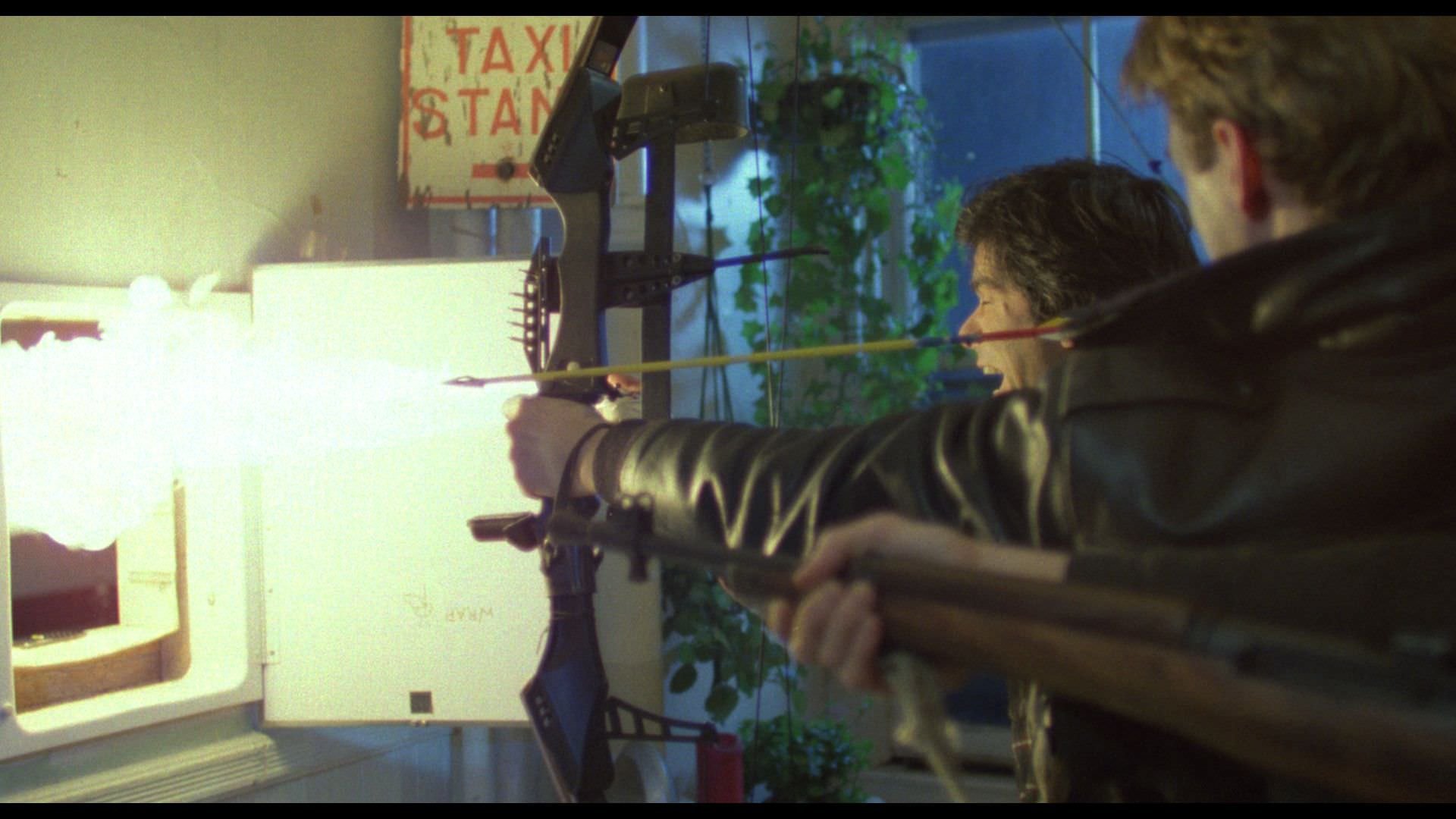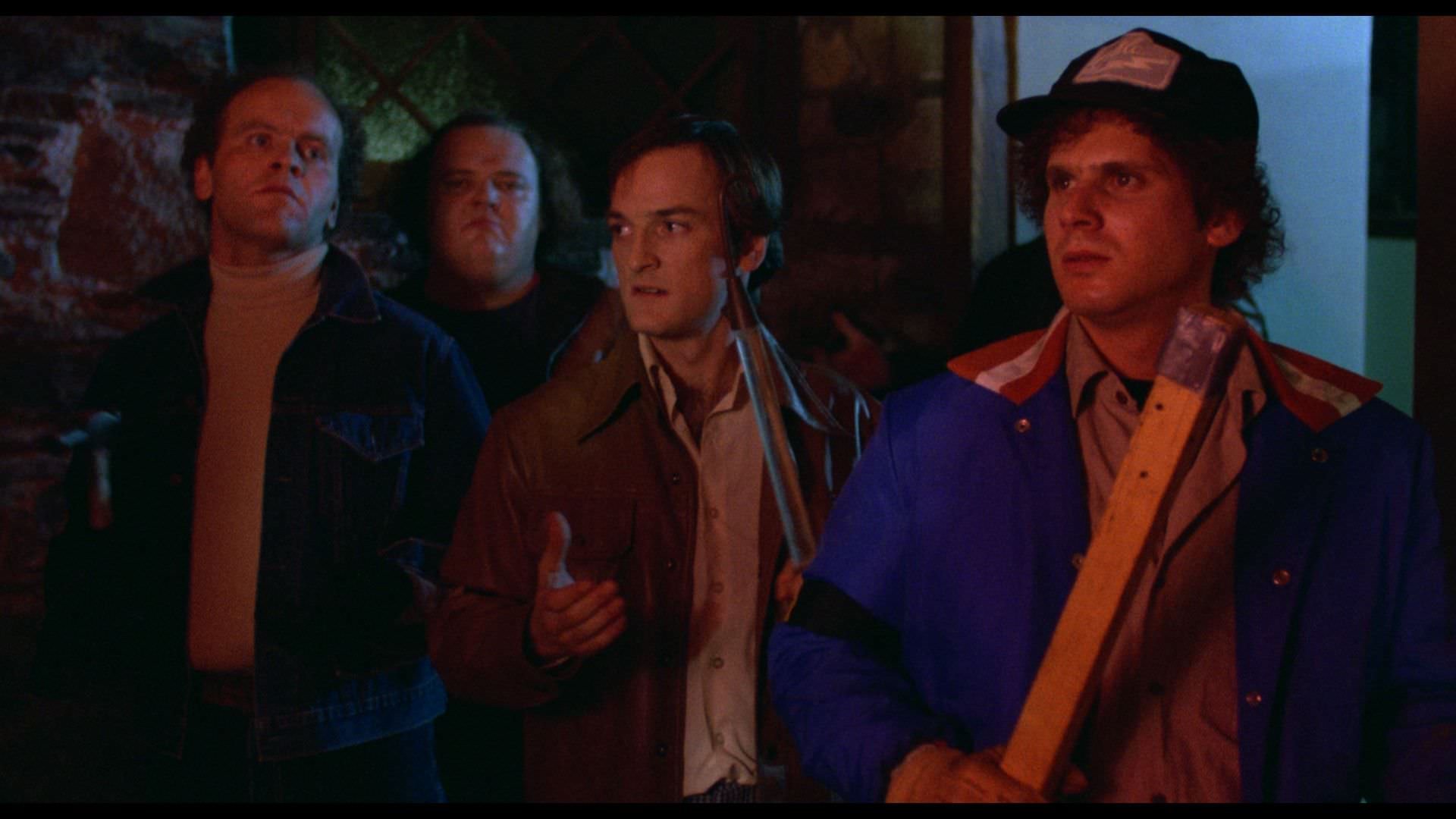[Pride 2022] Rarely Seen 'Siege' is a Must-See for Queer Audiences
I’ve recently come across the 1983 cult classic Canadian film Siege, also known as Self Defense, which seems to be having a resurgence since its re-release on Blu Ray and streaming services. The themes explored in the film also make it apparent why it’s still able to resonate with audiences today, and upon viewing I immediately understood how it became a must-see for queer audiences.
Directors Paul Donovan and Maura O’Connell expertly distill some of our greatest fears into this suspenseful trip down a queer a nightmare. In Siege we follow Daniel (Terry-David Després) as he seeks refuge amongst an unlikely and somewhat unwilling group of allies after he escapes an attack in a nearby gay bar.

Image from Severin Films
A group of right-wing extremists called “New Order,” have been emboldened by the small town’s ongoing police union strike. Donovan and O’Connell were able to use actual footage from the 1981 Halifax police strike, which heightens the film’s tension by providing plausibility to this night of terror.
The violence escalates quickly after the New Order attempt to intimidate patrons of a gay bar but end up killing the bartender in a scuffle. They call in their handler to deal with the remaining witnesses, but Daniel manages to escape and run off to a small apartment complex nearby. Despite some resistance, the residents of the apartment complex come together to defend Daniel—and themselves—from the New Order.
There is a bloody standoff between the two groups, and the residents of the apartment complex find creative ways to defend themselves with homemade weapons. The tight timeline sustains the suspense, and there are truly high stakes for our queer protagonist and his unlikely group of allies.
The characters had great complexity to them despite the limited dialogue and runtime. My distaste of Barbara (Brenda Bazinet) also left me inexplicably drawn to her character the most. As a queer Black woman, I encounter allies like Barbara regularly. Liberal and likeable enough, they also tend to not “want to get involved,” rely on methods that may actually enact more harm against queer folks (like attempting to call the police during a strike?), or otherwise try to bail once that stakes get too high.
What made Siege an effective horror to me was the threat that danger lay within refuge as well. The suspense that kept me on the edge of my seat was the unsettling familiarity of the threats Daniel faced.

Image from Severin Films.
The fear can be felt from all sides: the obvious threat of a New Order that wants to erase your entire existence, and relying on allies who have no skin in the game. We saw this violence play out at Pulse. We live this horror as Roe v. Wade is surgically disassembled right before our eyes. Our fear and our lived experiences are silenced as we’re told “Don’t Say Gay” and trans rights are systematically clawed back by conservatives and the Barbaras who allow it to happen by “not getting involved.”
I felt as vulnerable as Daniel must have felt trusting his life in his allies’ hands. This is the tightrope queer people walk often. I even felt a familiar dread after the “twist” ending, although I was almost certain Barbara and her liberal ilk would manage to be shocked by the (still deeply unsettling) revelation.
Siege is an absolute must-watch. This cult classic still feels fresh, in some ways that are unfortunate, but can still hopefully spark some meaningful conversation on how we can care for each other and build a resilient community while our rights are under siege. It may not look like taking up arms, but that doesn’t mean you have to wait for danger to reach your doorstep before you get involved.


![[Pride 2022] Rarely Seen 'Siege' is a Must-See for Queer Audiences](https://images.squarespace-cdn.com/content/v1/5b39608d75f9eef54c62c3f0/1654554124501-AREJ8UAAZ0R4G159T0LT/Siegestill4.jpeg)
![[Pride 2022] Final Girl and Slasher?: The Complex Identities and Sexualities of Chucky's Nica Pierce](https://images.squarespace-cdn.com/content/v1/5b39608d75f9eef54c62c3f0/1656424689445-67KI2KU21YV2HU1A0G1F/usa-chucky-season-2-fiona-dourif.jpg)
![[Pride 2022] Out of Body Decay in High Tension](https://images.squarespace-cdn.com/content/v1/5b39608d75f9eef54c62c3f0/1656423799220-ITUBL9H28BZ9Y2RY6GYS/MARIE_%28HAUTE_TENSION%29.jpg)
![[Pride 2022] The Messy Queerness of What We Do in the Shadows](https://images.squarespace-cdn.com/content/v1/5b39608d75f9eef54c62c3f0/1656423105759-GQJ0JXQWEWIP7MAAV0Z4/wwdits_101_0800r.jpg)
![[Pride 2022] The Legacy of Sander Cohen and Queerness in Horror Games](https://images.squarespace-cdn.com/content/v1/5b39608d75f9eef54c62c3f0/1656342724783-0TNZGH5D8B7RZQVAZJ7U/Burial_at_sea_Cohen.jpg)
![[Pride 2022] The Historical Significance of Fear Street 1666](https://images.squarespace-cdn.com/content/v1/5b39608d75f9eef54c62c3f0/1656422353740-FHBWCZUFG6FE13AZRP6H/fear-street-part-3-1666-00-05-22-18r1-rgb.jpg)
![[Pride 2022] The Solace of Horror: Psycho IV and Me](https://images.squarespace-cdn.com/content/v1/5b39608d75f9eef54c62c3f0/1656342022957-BFL4A9657KNSOSB3YFS1/FFtpf18X0AU6Q3V.jpg)
![[Pride 2022] "You Smell Pretty": Satanic Lesbianism in 'The Blackcoat's Daughter'](https://images.squarespace-cdn.com/content/v1/5b39608d75f9eef54c62c3f0/1655999780945-TMYUH81TAEDNTFXFXRBP/maxresdefault.jpg)
![[Pride 2022] Growing Up With Carrie](https://images.squarespace-cdn.com/content/v1/5b39608d75f9eef54c62c3f0/1656000657372-YREKNOWC68RHBYJIX9PU/carrie_prom_1050_591_81_s_c1.jpg)
![[Pride 2022] In the Flesh -- The Gay Zombie Show You May Have Missed](https://images.squarespace-cdn.com/content/v1/5b39608d75f9eef54c62c3f0/1655756844372-J99TTD92DA6B3XR0OJF4/p01xg48r.jpg)
![[Pride 2022] Let Queer People Tell Queer Stories: An Interview with Director Sam Wineman ](https://images.squarespace-cdn.com/content/v1/5b39608d75f9eef54c62c3f0/1655758021833-LOXW71UHS1Q4G5SHQQ7P/SamWinemanHS.jpeg-1.jpg)
![[Pride 2022] Elden Ring Confirms that Fantasy is the Lands Between for Queer People](https://images.squarespace-cdn.com/content/v1/5b39608d75f9eef54c62c3f0/1655757640880-52S6WQI8MWUV59IWMCQ3/Elden-Ring-Turtle-Pope.png)
![[Pride 2022] Horror and the Power of Queer Pride](https://images.squarespace-cdn.com/content/v1/5b39608d75f9eef54c62c3f0/1655755026985-N9MF4ATJQ3B61LU5POE8/Bride-of-Chucky.jpeg)
![[Pride 2022] Swing Your Razor Right](https://images.squarespace-cdn.com/content/v1/5b39608d75f9eef54c62c3f0/1655759420489-Y7CAL2V1EHAYVVG4VYHR/Harry+3.jpg)
![[Pride 2022] IT’s Fine to Project Onto Your Favorite Characters; or Eddie Kaspbrak Isn’t Straight and Neither Am I](https://images.squarespace-cdn.com/content/v1/5b39608d75f9eef54c62c3f0/1655756285693-Q2PY24VXV63BBWSB4KGD/Eddie.jpg)
![[Pride 2022] Freddy Krueger's Christmas Sweater: On Kelly Rowland, cigarette emojis, and the American Flag](https://images.squarespace-cdn.com/content/v1/5b39608d75f9eef54c62c3f0/1655780859540-0L9SR4EF2IT93HWEEMJD/kelly-freddyvsjason1.jpg)
![[Pride 2022] "Was It Good For you, Too?" Queer Desire in Resident Evil: Revelations 2](https://images.squarespace-cdn.com/content/v1/5b39608d75f9eef54c62c3f0/1655687751962-3L6L4C8IOKLUSIQD1QHY/4e73157bd57a8c5848b2cc1ce0d9a7eb.png)

![[Pride 2022 Short Story] Worms](https://images.squarespace-cdn.com/content/v1/5b39608d75f9eef54c62c3f0/1655515137637-XSR8DEACPGV19O89L8DF/fishing-g93a06373c_1920.jpg)
![[Pride 2022] We Belong Dead; Universal's Frankenstein Through a Queer Lens](https://images.squarespace-cdn.com/content/v1/5b39608d75f9eef54c62c3f0/1655318372118-DJCL558DU68CG5U9KS1F/tumblr_58c180f2dbf1d5caefeec02820c0f1bf_72a1584c_540.jpg)
![[Pride 2022] There I Am.](https://images.squarespace-cdn.com/content/v1/5b39608d75f9eef54c62c3f0/1655317755613-A1H7MWFTP8U3Y9X70I2H/sofa-2.jpg)
![[Pride 2022] Finding Confidence Through Books and Films](https://images.squarespace-cdn.com/content/v1/5b39608d75f9eef54c62c3f0/1655079835120-I45ECYY7FUBPABM4BUPG/briefencounter1945.69696.1.jpg)
![[Pride 2022] Torture Porn and the Sexuality Spectrum](https://images.squarespace-cdn.com/content/v1/5b39608d75f9eef54c62c3f0/1654964838917-X44MEXIETY6TKAVMQYT8/1+HdYaga2ysd2cAOdUyJ85Gg.jpeg)
![[Pride 2022] Comfort in the Grotesque: A Queer Take on Body Horror](https://images.squarespace-cdn.com/content/v1/5b39608d75f9eef54c62c3f0/1655078139527-8HHFBMPY4HUXKO1W0B6J/vlcsnap-2011-12-30-07h42m32s88.png)
![[Pride 2022] The Blob is Non-Binary: Change My Mind](https://images.squarespace-cdn.com/content/v1/5b39608d75f9eef54c62c3f0/1654960976783-EQ472JWBNZ4GAP4LJ4BH/blob-58-2.jpg)
![[Pride 2022] Let it Play: How Horror Helped me Face my Intrusive Thoughts](https://images.squarespace-cdn.com/content/v1/5b39608d75f9eef54c62c3f0/1654961575027-75HVJMCAR65JBQ5O9WP3/386d170d5537059388fe67380dd23318.jpg)
![[Pride 2022] The Bisexual Subtext of Stu Macher](https://images.squarespace-cdn.com/content/v1/5b39608d75f9eef54c62c3f0/1654959612093-ZILQ33GYM1W839VDY41V/1.-Matthew-Lillard.jpg)
![[Pride 2022] Signed, Sealed Delivered: Asexuality and Horror](https://images.squarespace-cdn.com/content/v1/5b39608d75f9eef54c62c3f0/1654779766958-LYN6R0LUUBSNA2IL44EB/image.jpg)
![[Pride 2022] 'In The Flesh': A Dissection of Queer Identity](https://images.squarespace-cdn.com/content/v1/5b39608d75f9eef54c62c3f0/1654779394348-WX45EEYMOWUVG3O5IT26/p01xklcs.jpg)
![[Pride 2022] The Incessant Conformity of 'Vivarium' (2019)](https://images.squarespace-cdn.com/content/v1/5b39608d75f9eef54c62c3f0/1654638468146-8RYS4POJAXP51RF4ZPXK/vivarium-bed.jpeg)
![[Pride 2022 Interview] Never Sleep Again: An Interview with Dead Sled’s Diana Whittles](https://images.squarespace-cdn.com/content/v1/5b39608d75f9eef54c62c3f0/1654565710056-IHQ50GE3S7B9Q1CFNNZ5/Screenshot+2022-06-06+at+20-34-55+About+Us+About+Dead+Sled+Coffee+%26+Mission+Statement.png)
![[Pride 2022] Dracula's Daughter: Queer Subtext and Lesbian Longing in the 1930s](https://images.squarespace-cdn.com/content/v1/5b39608d75f9eef54c62c3f0/1654552633114-ANVEIMELBRO61078DVQT/dracsdaughterskin.jpg)